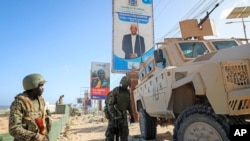The African Union Transition Mission in Somalia on Sunday resumed handing over security responsibilities to Somali government forces after a three-month pause, officials said.
The mission known as ATMIS handed over security control of the State House – also known as Villa Somalia — where Somali President Mohammed Hassan Sheikh Mohamud resides and works. Additionally, troops turned over responsibilities of the parliament building, which is not far from the presidential palace.
Along with Somali forces, AU forces have been securing strategic sites in the capital, including the palace, the parliament building, airport and seaport, since 2007. Somali forces now take sole responsibility for the main seats of the executive and legislative branches of government.
In an interview with VOA Somali, the AU envoy to Somalia and the head of ATMIS, Mohamed El-Amine Souef, confirmed the resumption of the drawdown.
“We are going to hand over the State House, Villa Somalia and the parliament, which is a big achievement and a good signal, from the FGS [Federal Government of Somalia] to the international partners that they are ready to take over their responsibility, and the rest of the FOBs [Forward Operating Bases] will follow until the 31st of December,” he said.
He said the mission will withdraw 3,000 soldiers by the 31st. The mission will hand over responsibilities for 10 bases in this phase of the drawdown.
Hussein Sheikh-Ali, the national security adviser to the president of Somalia, confirmed the transfer of the palace to the Somali army and police, and thanked the Ugandan forces who have been protecting it for the past 16 years.
The first phase of the AU drawdown was concluded in June when 2,000 troops left Somalia. In September, the Somali government requested a 90-day “technical pause” of the drawdown after military setbacks from the central regions’ offensive against al-Shabab militants who have been fighting the government since 2007. The militants aim to establish a government based on their interpretation of Sharia, or Islamic law.
A meeting in New York last week endorsed Somalia’s security sector development plan. According to Ali, the plan includes Somalia generating land forces of up to 30,000 excluding Special Forces, navy and air force, a police force of 40,000 at federal and regional levels, and 8,500 members of the custodial corps, who work in the prison system.
“We have reached the number that is required but it requires thorough reform to ensure the number and the quality match in order to have a professional army that can take responsibility from ATMIS,” Ali told VOA last week.
Souef says Somali authorities generated forces with the support of their international partners including Ethiopia and Uganda, which already have troops as part of ATMIS; but also, others like Eritrea, Egypt, Turkey, the United Kingdom, United Arab Emirates, United States, and the European Union.
He said another boost the Somali government received was the recent lifting of an arms embargo.
“Now the government of Somalia has the capability and the possibility to acquire the required arms and appropriate equipment and ammunition, so then they will be in a good position to fight against the enemy, so I think they have the capability,” he said.
“I think they are ready because what we say, where there is a will there is a way,” Souef said when asked if Somali authorities are ready this time to take over responsibilities.
The original AU mission, the African Union Mission in Somalia, or AMISOM, transitioned to ATMIS in April of last year after the Somali government and AU agreed on the current drawdown. The ATMIS mission is expected to hand over responsibilities to Somali authorities by the end of next year. Souef says that does not mean the end of AU support to Somalia.
“Now we are in a transition mission, but we will go to another transition because the AU is required to support the Somalis by first January 2025 by establishing a new mission with a new mandate,” he said.
He said the new mission will be able to support Somalia’s national army in terms of capacity building, to protect people in populated areas as well as strategic infrastructure in Mogadishu and other capitals of federal member states.
The number of troops under the new mission is not yet known but it will also have a small component of civilians to handle issues of human rights and political affairs and work closely with the federal government, Souef added.
“It will be like AMISOM or like ATMIS but not ATMIS, not AMISOM; it will be a new mission and a new mandate,” he said.
“December 2024 is not the end of the African Union in Somalia.”
Ali confirmed the Somali government is negotiating a “multilateral protection force” after ATMIS.
“It’s too early to give you any concrete details about what the new proposal will look like,” he said in a message via the WhatsApp messenger.
“We are just starting to negotiate the scope and the structure. What we know is that it is going to be a multilateral protection force working very closely with the Somali Security Forces for critical infrastructures in major cities where international agencies and embassies operate.”
Ali did not rule out the likelihood that the new mission will be under the AU umbrella.





